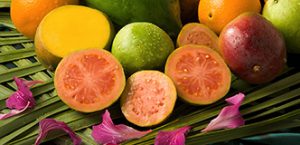Resumen
This publication presents the estimated costs and returns associated with the operation of an established pink guava grove in south Florida. The information presented was collected through field interviews with growers and industry specialists; it reflects a wide diversity of production techniques in small guava orchards. The information presented is intended only as a reference to estimate the financial requirements of operating an established pink guava grove.
Citas
Crane, J., and C. Balerdi. 2016. Guava growing in the Florida home landscape. HS-4. Gainesville: University of Florida Institute of Food and Agricultural Sciences. http://edis.ifas.ufl.edu/mg045
Karst, T. 2011. "U.S. Allowing Irradiated Guava Imports." The Packer. http://www.thepacker.com/fruit-vegetable-news/crops-markets/us_allowing_irradiated_guava_imports_122053224.html
Morton, J. 1987. Guava. https://www.hort.purdue.edu/newcrop/morton/guava.html
Marzolo, G. 2016. Guava. Agricultural Marketing Resource Center, California State Polytechnic University, Pomona, CA. http://www.agmrc.org/commodities-products/fruits/guava/
Mossler, M., and J. Crane. 2009. Florida crop/pest management profile: Papaya. CIR1402. Gainesville: University of Florida Institute of Food and Agricultural Sciences.
Popenoe, W. 1920. Manual of Tropical and Subtropical Fruits. New York: MacMillan.
USDA-AMS. 2017. Terminal Market Price. https://www.marketnews.usda.gov/mnp/fv-report-config-step1?type=termPrice
Unless otherwise specified, articles published in the EDIS journal after January 1, 2024 are licensed under a Creative Commons Attribution-NonCommercial-NoDerivs 4.0 International (CC BY-NC-ND 4.0) license.

